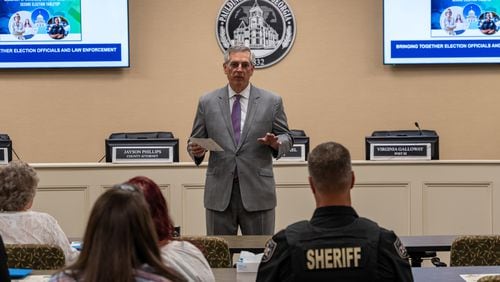Minutes after Gov. Nathan Deal said he would veto the 'religious liberty' bill that reached his desk less than two weeks ago, state Sen. Mike Crane called on his fellow lawmakers to overturn the governor's decision.
Crane, a Newnan Republican running for Congress, said Deal's announcement Monday "is another example of how the political class is bought and paid for by corporations and lobbyists. Rather than standing up and protecting the 1st Amendment, the political class would rather sacrifice those rights to keep the money flowing."
Lawmakers adjourned for the year Thursday. There are ways, however, they could return to Atlanta before January. The governor can order them back — which is unlikely.
Barring that, the state Constitution says legislators can decide to return on their own. Three-fifths of the members of both the House and Senate have to “certify to the governor in writing … that in their opinion an emergency exists in the affairs of the state.”
That would require 108 members of the House and 34 members of the Senate to call themselves back in. House Bill 757, the source of all this hubbub, received the votes of 104 of the 118 Republican members of the Georgia House and of 37 of the 39 Republican members of the Senate.
Crane is not the first GOP lawmaker to call for a special session. Sen. Bill Heath, R-Newnan, last week said if Deal vetoed the bill he'd want his colleagues back at the Capitol to consider an override, which takes two-thirds majorities in both the House and Senate.
Any special session would cost taxpayers about $41,000 a day in per diem paid to state lawmakers, along with any other costs associated with a session, such as printing and staffing.
Special session or not, Deal’s veto of the bill assures one thing: the debate is not over.
"The question we have to resolve is whether or not government is going to be used to punish people with a particular point of view," Sen. Josh McKoon, R-Columbus, one of the champions of religious liberty bills in the General Assembly, said.
McKoon was speaking with Boston NPR station WBUR via telephone. “I see that in my state,” he said. “I fully expect we’ll be back next year debating this again.”
But, in a sign of how difficult it would be to override the governor, other lawmakers sent Deal messages of support Monday. Rep. Beth Beskin, an Atlanta Republican, said via Twitter: "Thank you, Governor Deal, for reaffirming 'Georgia is a welcoming state' and vowing to veto HB 757."
Sen. Elena Parent, D-Atlanta, said much the same: "Thank you for vetoing HB757, @GovernorDeal. You have made the right decision for our time and history will reflect that."
House Speaker David Ralston, R-Blue Ridge, who supported the original version of HB 757 that simply made clear no pastor could be forced to perform a same-sex wedding ceremony, said Monday the final version of the bill was a thoughtful balance that provide protections for people of faith while not promoting discrimination.
“I have shared many of the same concerns expressed by Governor Deal,” Ralston said in a statement. “That is why I have insisted throughout this entire debate that any measure we passed must not only protect the free exercise of religion and faith-based organizations, but also had to include clear anti-discriminatory language. I believed, and still do, that HB 757 met the test we shared.
“It is regrettable that the merits of this measure have been ignored in the days since its passage by critics who had not taken the time to read the bill or understand the legal issues involved.”
Lt. Gov. Casey Cagle, too, said it was regrettable the bill’s merits were not discussed more.
“The Georgia General Assembly worked hard to find the right balance on this most challenging of issues,” Cagle said in a statement. “An important and legitimate concern has been largely lost in the hyperbole and criticism surrounding this debate: Our state can and should take an active role in protecting the right of individuals to practice their faith without government interference. I’ve always advocated for Georgia’s status as the number one state to do business, but as we move forward I will never lose sight of the importance of an individual’s right to practice their faith.”
Ralston and Cagle did not comment on calls for a special session or whether they would support a vote to override the governor’s veto.
The last time there was a major veto war came in 2007, when Gov. Sonny Perdue nixed a mid-year budget, including a last-minute $142 million property tax rebate. The House, led by Speaker Glenn Richardson, R-Hiram, who pushed the tax cut, voted to override the veto, but the Senate, led by Cagle, didn’t react. A special session loomed to reconsider the mid-year budget, which would have likely resuscitated the tax cut debate. But after the session, Perdue undid his veto of the budget, but used a line-item veto on the tax cut.
When the next session opened in January 2008, the House voted to override 12 of Perdue’s vetoes from the previous session, but Cagle’s Senate again wouldn’t join in. The Senate agreed to a symbolic override on one minor bill.
Before that, the last override of a veto came in 1974, when Jimmy Carter was governor and Tom Murphy was a new House speaker. Carter went on to become president and Murphy was one of the longest serving House Speakers in U.S. history.






